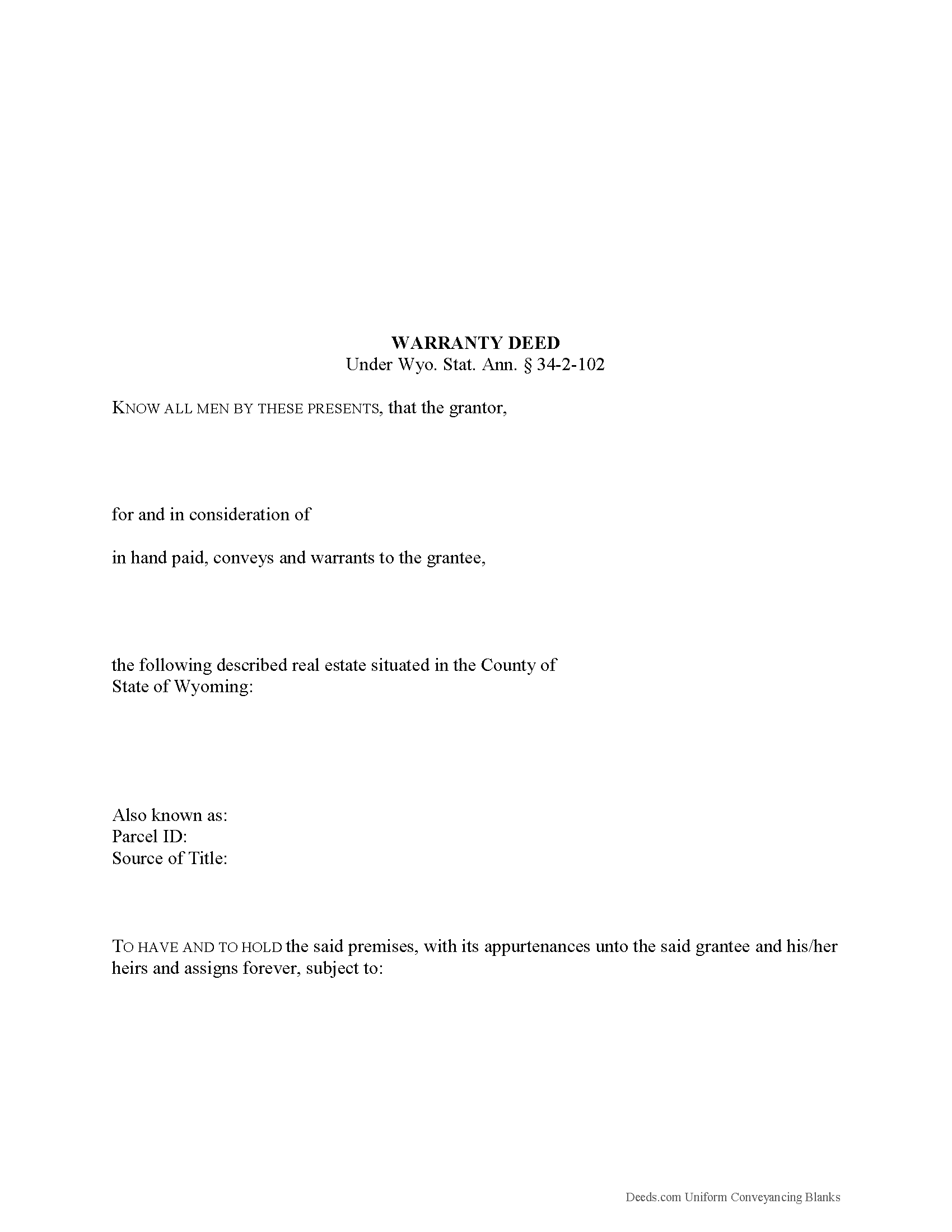Wyoming Warranty Deed
County Forms
Where is the property located?
Albany CountyBig Horn CountyCampbell CountyCarbon CountyConverse CountyCrook CountyFremont CountyGoshen CountyHot Springs CountyJohnson CountyLaramie CountyLincoln CountyNatrona CountyNiobrara CountyPark CountyPlatte CountySheridan CountySublette CountySweetwater CountyTeton CountyUinta CountyWashakie CountyWeston CountyWarranty Deed for Real Estate Located in Wyoming

In Wyoming, title to real property can be transferred from one party to another using a warranty deed. When recorded, a warranty deed conveys an interest in real property to the named grantee with full warranties of title. A warranty deed offers the most assurance of title. This assurance is greater than that of a limited or special warranty deed, which guarantees the title only against claims that arose during the time the grantor held title to the property, or a quitclaim deed, which offers no warranties of title.
Warranty deeds are statutory conveyances under Wyo. Stat. Ann. 34-2-102. A warranty deed conveys real property in fee simple to the grantee and contains covenants from the grantor that he or she holds title to the property and has "good right and power to convey the same" (Wyo. Stat. Ann. 34-2-103). The covenant guarantees that the property is "free from all incumbrances" and that the grantor "warrants to the grantee, his heirs and assigns, the quiet and peaceful possession of such premises, and will defend the title thereto against all persons who may lawfully claim the same" (34-2-103). The use of the words "convey and warrant" in the deed implies full warranties of title on the part of the grantor or his representatives (34-2-103).
A lawful warranty deed includes the grantor's full name, mailing address, and marital status, the consideration given for the transfer, and the grantee's full name, marital status, vesting, and mailing address. Vesting describes how the grantee holds title to the property. Generally, real property is owned in either sole ownership or in co-ownership. For Wyoming residential property, the primary methods for holding title are tenancy in common, joint tenancy, and tenancy by entirety. A conveyance of real estate to two unmarried persons creates a tenancy in common, unless another intention is clearly specified (34-1-140). Tenancy by entirety is only available to married couples, and is the presumed vesting unless otherwise stated.
As with any conveyance of realty, a warranty deed requires a complete legal description of the parcel. Recite the prior deed reference to maintain a clear chain of title, and detail any restrictions or agreements associated with the property. The finished copy of the deed must be signed by the grantor and notarized. Record the original completed deed, along with any additional materials, with the clerk's office of the county where the property is located. Contact the same office to verify accepted forms of payment.
All Wyoming conveyances require a completed Statement of Consideration. Find this form on the county clerk's website, or through the Wyoming State Board of Equalization website. It is the responsibility of the buyer (or the buyer's agent) to fully complete the Statement of Consideration (34-1-142) and to pay any applicable transfer taxes.
This article is provided for informational purposes only and is not a substitute for the advice of an attorney. Contact a Wyoming lawyer with questions about warranty deeds, or any other issues related to the transfer of real property.
(Wyoming WD Package includes form, guidelines, and completed example)